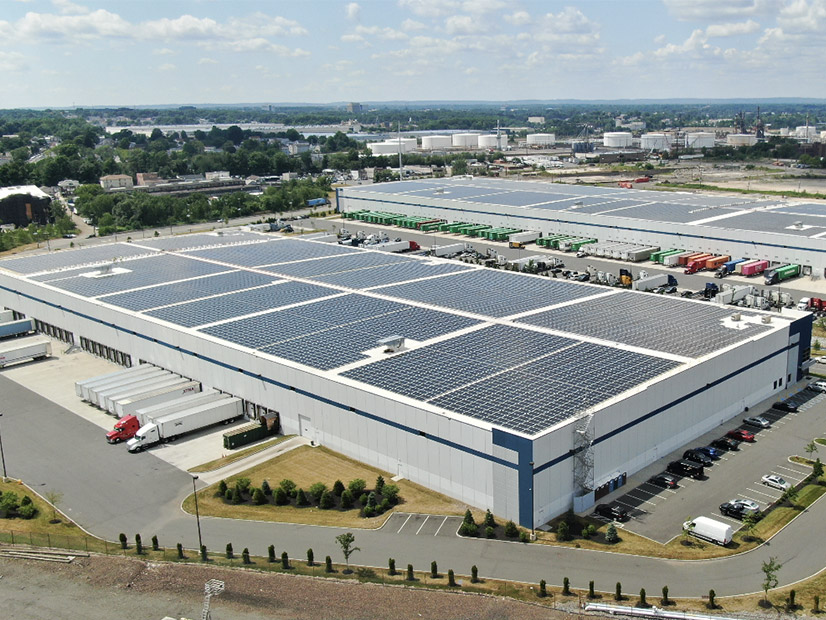
A solar project was installed on a warehouse rooftop in Perth Amboy as part of New Jersey's Community Solar Energy Pilot Program
| Solar LandscapeNew Jersey Gov. Phil Murphy signed two bills into law on Monday: one requiring that new warehouses be built ready for the installation of solar energy systems, and the other mandating builders to provide customers with an option to use low-carbon concrete for new construction.
The two bills were among more than 50 bills that Murphy signed into law as the New Jersey Legislature began its fall session. The legislature took a break for the summer and the run-up to the Nov. 2 election in which Murphy and all state legislative seats, in both the Assembly and the Senate, were on the ballot.
Murphy was narrowly re-elected, and Monday’s bill signing sends a clear signal that the governor will likely continue his ambitious climate policies, putting the state on a path to a completely decarbonized grid by 2050. (See: NJ’s Murphy Expected to Stay the Course on Clean Energy Policies).
Passed in the spring, both bills would have become law automatically once the legislature returned to work even if Murphy had not signed them.
The solar bill (A3352) requires warehouse developers to ensure that at least 40% of the area of a new warehouse roof is available and structurally ready to support solar photovoltaic or thermal systems. The area is calculated after the space taken up by skylights, occupied roof decks, vegetative roof areas and other uses is removed from the calculation.
New Jersey, like other states, has seen a surge in demand for warehouse space, triggered by the COVID-19 pandemic and the resulting dramatic shift in consumer behavior from in-person to online shopping. The demand for space for fulfillment centers and smaller warehouses to serve as launchpads for last-mile deliveries has been driven in New Jersey, in part, by the presence of the Port of New York and New Jersey, the third largest port on the East Coast.
The second bill signed by Murphy (S3091) encourages the use of concrete that is created under controlled conditions — known as “unit concrete” — and is certified as “generating at least 50% less carbon dioxide emissions” in its production. Unlike regular concrete, which is delivered wet to a construction site and dries on the job, unit concrete is prefabricated and delivered in ready-to-use form, often as pavers or concrete blocks.
The bill addresses what some analysts see as a key generator of greenhouse gases, and one that is important to any effort to cut those emissions because of its prevalence in daily life. A May 2020 report by consultant McKinsey and Co. concluded that the cement industry is responsible for about a quarter of all industrial CO2 emissions worldwide and 7% of all emissions globally. Cement is a major component of concrete.
Clean Energy up for Vote
The Sierra Club’s New Jersey Chapter welcomed the solar signing. Acting Director Taylor McFarland said the legislation will help the state “improve its solar energy capacity” and help fight climate change.
But McFarland said the bill promoting the use of low-carbon concrete is “not enough,” calling the industry “environmentally destructive from cradle to grave.” Cement manufacturing “emits a host of air pollutants” and a high level of carbon dioxide, she said.
Another bill in the legislature (A5223) also promotes the use of low-carbon concrete but has yet to advance. The proposed legislation would require state agencies taking bids for construction “to apply a low embodied carbon discount rate to the price of bids.” The discount would reduce the price of the bid by up to 5%, and developers would be eligible for a corporate tax credit to offset the discount price.
The fall session, which runs through mid-January, is expected to include discussion of several other bills related to climate change. On Monday, the Senate Environment and Energy Committee will vote on newly introduced legislation (S4077) that would create a three-year pilot program to examine the potential benefits and problems of wider adoption of electric school buses. (See: NJ Floats New Electric Bus Plan.)
The committee also will consider A2360, a bill that would require electric utilities to charge residential rates, but nothing higher, for customers charging electric vehicles at home.
The Sierra Club is looking for the passage of a bill (S2484) that would establish an Office of Clean Energy Equity within the New Jersey Board of Public Utilities. The office would be responsible for overseeing the “equity deployment of clean energy” in low-income, minority communities.
Other pending legislation that could be taken up includes a bill (A4899) that would expand the state’s electric vehicle incentive programs to include motorcycles. Another (S3665) would require manufacturers of EVs to establish and implement battery recycling plans.


